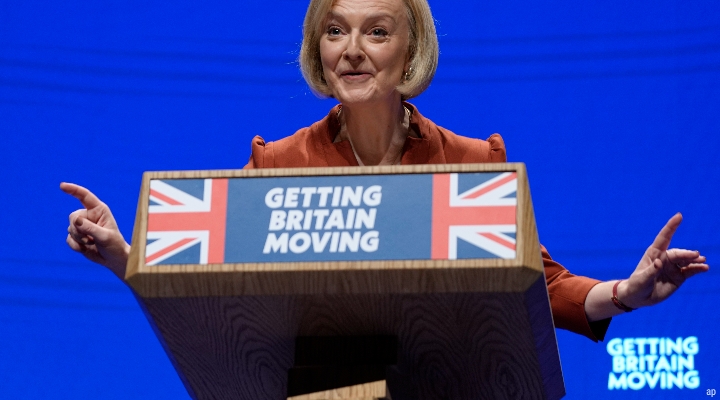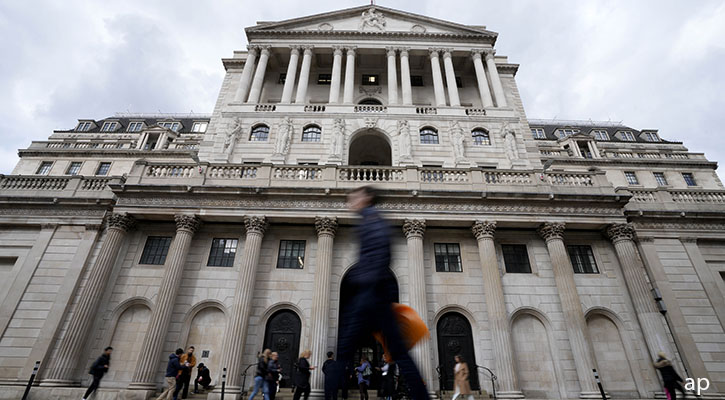
The prime minister has performed a dramatic sacking today, ousting chancellor Kwasi Kwarteng after just 37 days as he returned from the IMF in Washington.
Liz Truss also confirmed a U-turn on the cut to corporation tax next year, which was one of the key pillars of the mini-Budget three weeks ago. But she refused to go into more detail, saying that the "medium term fiscal event" of October 31 will outline plans further. With the U-turn on the abolition of the 45p tax rate, the government has now reversed two elements of the September 23 speech by Kwarteng that sparked turmoil in the markets.
At a brief press conference on Friday afternoon, she also failed to answer the key questions about why Kwarteng was sacked and what that means for her political future. Truss has already secured Kwarteng's replacement, in the form of Surrey MP and former health secretary-cum-leadership-contender Jeremy Hunt, who will take over Whitehall's most powerful department and deliver the next mini-Budget.
What of the dislocations in the government bond markets since September 23? Even as she performed the second U-turn, Truss insisted that parts of Conservatives' plan went "further and faster than markets were expecting". She also repeated the "fiscal discipline" mantra that was a key part of her conference speech. "We need to act now to reassure the markets of our fiscal discipine." But she inisted that the Tories remain wedded to the "low tax, high growth" course.
In a peremptory Q&A session with journalists, Truss stuck by her key phrases like a rhetorical riot shield, that she "acted decisively" in the pursuit of "economic stability". She also claimed to be acting in the "national interest" a number of times.
Will the government change course now that the bond markets have voted against the fiscal plans?
"The mission remains the same", she insisted, although she did concede vaguely, that "we have to achieve the mission differently". She replied a handful of journalist questions (Telegraph, Sun, Peston) with the same answers and left, leaving the media clamouring for more explanation and detail. The questions were: why should you stay in the job when Kwarteng has been fired, and have you lost all credibility with the electorate?
This was hardly a rallying speech, and the markets were not convinced. The pound remained under pressure and was languishing at $1.12 by Friday evening local time. Gilt yields are lower, however, as markets got the whiff of change in the air today.
Today the Bank of England's bond-buying programme ended, as Andrew Bailey confirmed this week it would (although there was a brief hint of a U-turn on this), and the governor will be hoping that this drama in Westminster will take the heat off the central bank. Still, next week brings the September inflation figures for the UK back into focus - signs from the US that inflation is not budging will not be welcome. Further chaos in the gilt markets will bring that pressure back to bear on the Bank of England.
'You Asked Me to Stand Aside'
In a gushing resignation letter to the prime minister, Kwarteng said:
"You have asked me to stand aside as your chancellor. I have accepted.
"When you asked me to serve as your chancellor, I did so in full knowledge that the situation we faced was incredibly difficult, with rising interest rates and global energy prices.
"However, your vision of optimism, growth, and change, was right.
"As I have said many times in the past weeks, following the status quo was simply not an option. For too long this country has been dogged by low growth rates and high taxation - that must still change if this country is to succeed.
"The economic environment has changed rapidly since we set out the Growth Plan on 23 September. In response, together with the Bank of England and excellent officials at the Treasury we have responded to those events, and I commend my officials for their dedication.
"It is now important as we move forward to emphasise your government's commitment to fiscal discipline. The medium-term plan is crucial to this end, and I look forward to supporting you and my successor to achieve that from the backbenches."
Major Climbdown
During her various pitches to be leader of the Conservative Party, Liz Truss had attempted to differentiate herself from rival Rishi Sunak by proposing the largest set of tax cuts in half a century. Among them, a pledge to abandon a planned rise in corporation tax, and increases to National Insurance.
Abandoning the headline-grabbing plan represents a major climbdown for Truss, who has struggled to convince just about everyone she is leading a government that respects the rules of fiscal discipline.
Indeed, the last three weeks has witnessed a heady and hazy start to the prime minister's tenure at Downing Street, as the consequences of the so-called "Mini-Budget" fed into the markets, amid shock, dismay, and unprecedented concern among Tory grandees.
While certain government ministers have attempted to reassure investors and voters that the chaos in the gilt and mortgage markets was a result of factors outside the government control, senior Tory MPs, and investors themselves, just haven't bought the attempt at gaslighting.
In the last 48 hours alone, Liz Truss's credibility has been called repeatedly into question by her parliamentary colleagues, amid what some media outlets have described as the early stages of an attempted coup against the prime minister.
Meanwhile, prominent commentators with insider knowledge of the Westminster circus are already signalling the end of the Truss era, barely a month after she entered Downing Street promising a return to economic growth and opportunities for all.









.png)


















